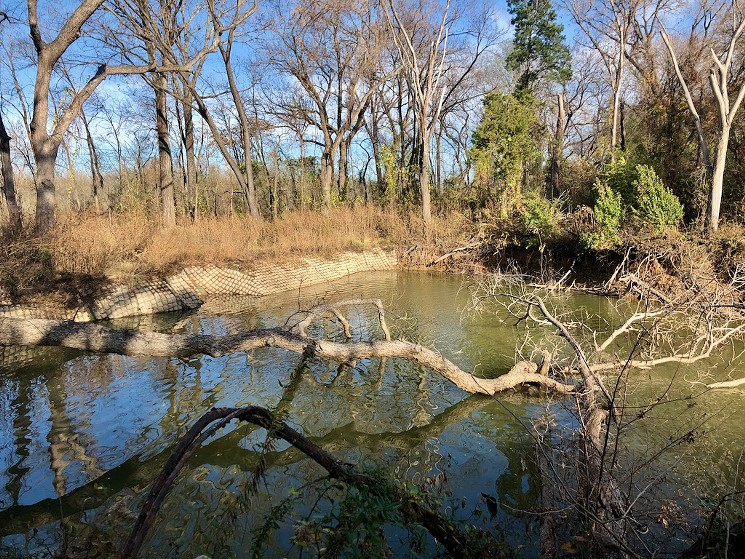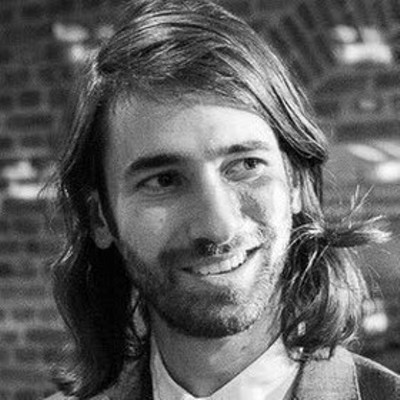
The city created a massive pit to build the course. After being censured by state regulators, it made efforts to mitigate the damage.
Lucas Manfield
"It's really disappointing to me and I know it's disappointing to a lot of people who live in the neighborhoods around that golf course, because they were promised by a number of elected officials that the development of this golf course would spur economic development," said Ben Sandifer, who has long advocated for the protection of the course's neighboring Great Trinity Forest.
"Now I'm worried it's not going to happen," he said.
Tournament officials blamed flooding and declining attendance. The course’s co-owner, Jonas Woods, told The Dallas Morning News that “the location, the infrastructure and amenities weren’t ideal,” in an exclusive interview announcing the decision.
A club spokesman said he had no information about future plans.
The course was created in 2014, "explicitly to attract prestigious golf championships back to Dallas," according to its website. But it was built on top of a toxic dump. As a result, despite the name, the course has no trees or water features.
To create a buffer between the trash and the green, construction crews extracted dirt from a giant hole dug into the neighboring city-owned horse park. "They took away approximately 30 acres of prime turnout pasture, beautiful prairies and trees in order to get inexpensive soil for their project," Sandifer said.
The Texas Commission on Environmental Quality investigated, found that a lack of erosion control around the pit constituted a "major" infraction and fined the city.
"That impact continues today," said Sandifer, citing changes in the forest's ecology and the disappearance of some plant species from the area.
The club's owners claimed the course would help revitalize the surrounding neighborhoods. It was built in one of Dallas' poorest ZIP codes, where more than 30% of residents are in poverty. In exchange, the city gave its owners a sweetheart 40-year lease — $10,000 per year — and spent millions upgrading infrastructure and stabilizing the landfill.
"I don't know who gained financially from this. But it wasn't southern Dallas at all," said Jim Schermbeck, director of the community activist group Downwinders at Risk. "This was a very North Dallas solution to a very fundamental problem that kind of just missed the point and wasted so much money and in the end became kind of a farce.""I don't know who gained financially from this. But it wasn't southern Dallas at all." — Jim Schermbeck
tweet this
The club was co-founded by Dallas billionaire Thomas Dundon, who also has a majority stake in TopGolf. Dundon explained that he was drawn to the deal by the accessibility of the company's family fun centers. "You can just show up with nothing and start playing," he told Golf World in 2017.
This was not the case at his golf course. According to its lease agreement, 25% of all rounds at the course must be "public rounds." In 2018, The Dallas Morning News investigated reports of community members being turned away and discovered that nonmembers had to arrange to play through a club member. Green fees are upward of hundreds of dollars.
Although the course claims 35% of rounds are "public play," Woods told the News that many of these were donated to charities.
The course partners with the Addison nonprofit First Tee, an "international youth development organization introducing the game of golf and its inherent values to young people." And revenues from the AT&T Byron Nelson tournament support the Momentous Institute, a nonprofit providing mental health services to Dallas families. It runs a school in Oak Cliff.
In the tournament's 51-year history, including 35 years at TPC Four Seasons Resort in Las Colinas, it raised $163 million for the institute. But those revenues dropped in 2019 as ticket sales and sponsorship revenue plummeted. Jessica Trudeau, the nonprofit's executive director, said the decline was "significant."
Trudeau said her primary concern is ensuring that the drama around the golf course doesn't test the organization's relationships in southern Dallas. "It's hard to build trust with a community, and it's very easy to lose it," she said.
The organization's last director made waves in early 2019 when she used her resignation as an opportunity to excoriate philanthropists for failing to address the city's systemic inequalities.
"Our current model is established to keep us in business,” Michelle Kinder told the News. "To allow us to do just enough good to feel better ... instead of just chipping away at the structural inequities from the lens of the wisdom of people impacted by it.”
Marsha Jackson, a local activist who lived near the course while it was being built, said she saw issues immediately. There wasn't much parking, and "it was always flooded out," she said.
"Some people were saying it helped the community, but it didn't help everybody," she said.
"The little communities right over there, they couldn't afford to go in there anyway."












